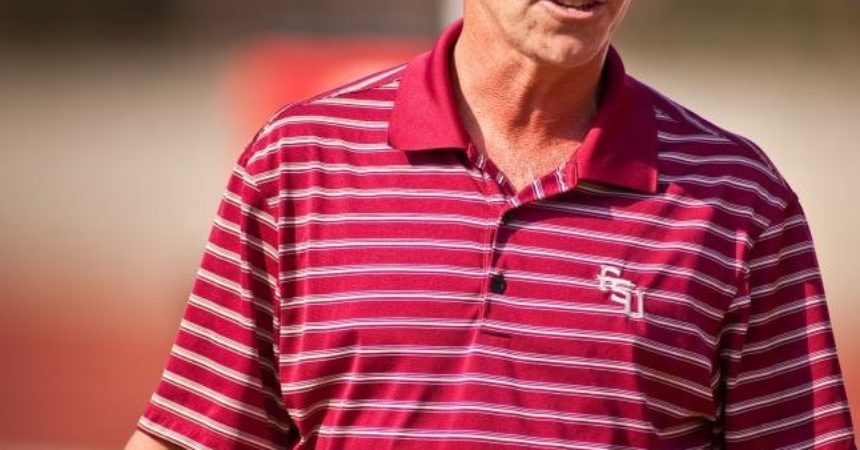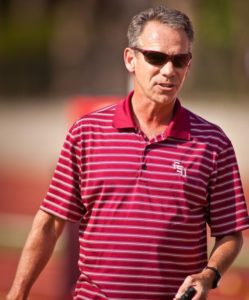
Ten recognized as indoor track & field All-Americans
Ten Florida State indoor track & field athletes were recognized as All-Americans by the U.S. Track & Field and Cross Country Coaches Association, 75 days after the cancellation of the 2020 NCAA Indoor Championships at the Albuquerque Convention Center.
Much has transpired since the Noles and their championship-qualifying peers were pulled from the track on the eve of the meet back on March 12; one of the first dominoes to fall in what became a complete shutdown of sports across the country in the wake of COVID-19.
The announcement last Tuesday by the USTFCCCA that all qualifiers for the meet will be recognized as All-Americans, provides a small consolation prize. That decision was rendered after lengthy discussions between the USTFCCCA Board of Directors and the NCAA Division I Track & Field Executive Committee.
“It’s the right thing to do,” said Florida State coach Bob Braman. “Indoors is fairly unique because it’s 16 athletes [in each individual event; plus the top 12 relay teams] and everybody competing in the meet had already achieved second-team All-American status with a chance at first-team. The nature of the sport is that you’ve done the work in the regular season to distinguish yourself at a really, really high level.

FSU track coach Bob Braman says a decision reached by the USTFCCCA Board of Directors and the NCAA Division I Track & Field Executive Committee to name national championship qualifiers as All-Americans was the fight thing to do.
Photo special to the Outlook
“I don’t think there’s another sport that has a national qualifying standard that narrow for an event. It’s good that they get something tangible for what they accomplished during the season to get to nationals.”
FSU’s 10 qualifiers – Taylor Banks, Braxton Canady, Trey Cunningham, Fabian Edoki, Isaac Grimes Jhevaughn Matherson and Caleb Parker for the men; Elizabeth Funderburk, Ka’Tia Seymour and Maudie Skyring for the women – will forever be recognized as All-Americans for their season-best achievements.
Seymour earned All-American honors in both the 60- and 200-meter dashes – the lone dual-event qualifier for the Noles – pushing the junior’s career total to 11 All-American honors. She joins Kimberly Williams in a tie for fifth for the most All-American honors within the women’s program.
Seymour was selected as ACC Indoor Track Performer of the Year, in a vote of conference coaches, following a season which included a sweep of the ACC Championship 60- and 200-meter dash titles. That double secured the Palatka, Fla. native her third consecutive ACC Indoor Championship Track Most Valuable Performer award; the first woman to ever accomplish that feat.
Cunningham, who was top-ranked nationally and unbeaten collegiately in the 60-meter hurdles, earned his third indoor All-American distinction in the event, pushing his career total to four. The Winfield, Ala., native broke his own ACC Championship meet record and became the first man to win three consecutive conference 60-meter hurdle titles. He was also selected ACC Indoor Track Performer of the Year, and later was named ACC Indoor Scholar-Athlete of the Year. Cunningham was one of three finalists for USTFCCCA Men’s Indoor Track & Field Athlete of the Year honors, as well as a season-long selection to The Bowerman Watch List.
Matherson (60-meter dash) collected his All-American second honor – his first individually – after claiming honors with the 4×100 relay in 2019.
Freshman Taylor Banks (60-meter dash), redshirt freshman Elizabeth Funderburk (5000 meters) and junior Maudie Skyring (mile run) earned All-American honors for the first time.
Four transfers are first-time All-Americans as Noles, adding to their All-American resumes from previous stops.
Canady and Parker (60-meter hurdles), a pair of first-year Noles, earned All-American honors at their previous schools in the event Canady with a three-time All-American at Oregon, while Parker was a two-time All-American at Southern Miss. Edoki (long jump) was a 2019 Indoor All-American in his event while competing for Middle Tennessee after claiming six NJCAA All-American honors at South Plains (Texas) College.
Grimes (long jump) was a five-time NCAA Division II All-American for Chadron (Neb.) State prior to transferring to FSU for the start of the 2019-20 school year.
“It certainly doesn’t make up for the chance to compete, which is what they really want, but down the road it’s not ignored as a vacant season,” Braman said. “I’m glad they have a chance to be honored. It will mean more to them 20 years from now than it is now. They’re not thinking that way, but 20 or 30 years down the road, to have achieved it, they’ll appreciate it.”







